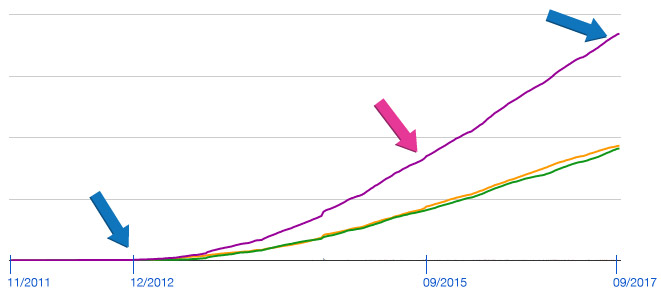Content marketing for small businesses - where to start?
Everyone recently talks of content marketing like the new holy grail you should acquire urgently. Yet, content marketing has been around for as long as Google exists, and there is no miracle solution - only good strategies. Let's discuss the right approach for small businesses and startups to get their content strategy right from the start.

What is content marketing?
If you attended my speech at the Digital Marketing & Strategy Innovation Summit in Hong Kong you already know the basics of content marketing. Otherwise, let's review together what is content marketing.
To find you on the internet, people will use search engines (Google or others). When they type keywords they get presented with links that correspond to the keywords they searched for. If you only have a self-centric website talking about you, people will specifically need to type keywords that directly relate to your business, such as your company name or a precise description of the services you offer.
If you want to increase your chances to be found, you will need to build content that reflects what people are looking for so you could appear in their search results.
That is content marketing - building content that appeals to your audience in order to increase your chances of being found, at no cost.
 Fréderic Canevet, Founder of conseilsmarketing.fr, recommends:
Fréderic Canevet, Founder of conseilsmarketing.fr, recommends:
"In order to write content that answers your prospect's needs, it is essential to focus on your prospect's problems, if possible those he encounters before a purchase. My experience shows me that good quality content takes time (count a couple of hours to write 1,500 words). Larger articles (2,000+ words) get better indexing in the long run. "
What are the pros & cons of content marketing?
A good content strategy takes time to build, time to execute, and even more time to start seeing results. It requires having someone able to write good content and the will and creativity to come up with innovative and quality content regularly.
On the good side, content marketing is free and has long lasting effects. The graph below shows you the evolution of subscribers on my blog over time.

- The first arrow identifies when effects started to show - it took approximately a year before the effect of content marketing kicked in.
- The second arrow show when I stopped writing on my blog - busy with many other activities and a second blog, I had to stop writing for a while.
- The third arrow identifies the date I restarted writing content for my blog
As you can see from the graph, the beauty of content marketing is that, even if it takes time to kick in, its effects are long lasting. Even though I stopped writing for almost 18 months, my number of subscribers kept growing, because I had built quality content that kept driving valuable traffic.
Now compare this to your Adwords campaigns - not only do they cost you money, but what happens when you stop? Correct! Traffic drops dramatically.
But there's more! Content marketing does not only bring you traffic: it builds credibility. People tend to trust someone who knows and writes a lot about his topic over someone who simply claims to be an expert in his own field.
It will also help you engage your audience and potentially build new connections. But as you've seen, the effects aren't immediate, so you may want to start early.
 Fréderic Canevet, Founder of conseilsmarketing.fr, recommends:
Fréderic Canevet, Founder of conseilsmarketing.fr, recommends:
"You must write for Google, meaning that you must focus on keywords that generate traffic. A good tips is to look for internal content: webinars, checklists, sales offers, etc. All these documents could easily be transformed into white-papers that add value without consuming your resources. "
Is content marketing another word for SEO?
No, content marketing could be considered one strategy among others to achieve Search Engine Optimization.
SEO contains many layers of best practice, such a website speed, code clarity and quality, backlinks, etc.
If you've heard that your website should work on SEO, you are absolutely right! And content marketing is a powerful step in the right direction.
You can learn more about it reading "Write SEO friendly content in 10 easy steps".
 Fréderic Canevet, Founder of conseilsmarketing.fr, recommends:
Fréderic Canevet, Founder of conseilsmarketing.fr, recommends:
"Writing content is good but no longer enough. It is essential to promote your article to prospects, influencers, through guest posting, etc. You may even consider paying for it. Competition is rough, so you should spend no less than 15 to 30 minutes distributing your content each time you publish it. "

I have a small business or a startup, what should I write about?
That certainly is the key question everyone wonders about. Should I talk about my startup? My services? My pricing? Why am I different from competitors?
Certainly not.
A good content strategy isn't built a self-centered content. You have your website to achieve that purpose. While it is always good to leave a short note about yourself in your articles, you cannot focus on yourself.
There are a few steps to take in order to build efficient content.
- Define your area of expertise - to talk about something, you first need to understand it. Identify the topics you sufficiently master in order to talk about them.
- Define who your audience is (to find out more, read "Target your customers precisely with buyer personas") and what they want to read about.
- Define a list of sub-topics you could cover and that would interest your audience.
To give you a concrete example, I handle the content marketing strategy of myfairtool through the website The Exhibitor.
The company offers an online solution to capture leads at trade shows. The blog, however, does not talk about how to use the software, how much it costs, how great it is, etc. The blog focuses on problems the audience (exhibitors) traditionally face: how to set up a booth, how to make a budget, how to promote the stall, how to follow-up with prospects, etc.
We have defined the area of expertise (trade shows), who the audience is (exhibitors), what they want to read about (how to manage a trade show exhibit) and concrete sub-topics (budget management, booth promotion, etc.).
It is now time for you to do the same: don't think about what YOU want to tell, think about what your audience wants to read, and build on it.
 Fréderic Canevet, Founder of conseilsmarketing.fr, recommends:
Fréderic Canevet, Founder of conseilsmarketing.fr, recommends:
"Defining your persona, meaning your typical client, is essential. It would be a mistake to develop content based on a theme. What matter is to build something that your buyer will connect with. Using personas implies creating precise descriptive profiles with problems, needs, concerns, etc. "
How often should I write?
The keys to content marketing are regularity, frequency, and quality. You need to publish content always using the same schedule, with a legitimate frequency (not less than once a month) and good quality.
If you can't respect these three aspects, content marketing may not be for you.
If you can, don't be too ambitious in the beginning. One article a day or even once a week might be easy at the start but become a problem soon. Define what your real capabilities are and always keep a backlog of articles for the periods you simply don't have time or inspiration to write.
 Fréderic Canevet, Founder of conseilsmarketing.fr, recommends:
Fréderic Canevet, Founder of conseilsmarketing.fr, recommends:
"Don't forget about omni-channel! Publishing something on your blog is key, but it remains equally important to use and share this content over multiple channels. For example, you could transform it into infographic for Facebook, podcast for iTunes, video for Youtube, etc. Having a blog is no longer sufficient! "
You should now have all the major keys to start an efficient content marketing strategy. If you need help defining your content, angle, tone, style or frequency, do not hesitate to get in touch so we could discuss the right approach for your business.
Last update: 2024-04-17 Tags: content marketing content strategy SEO startup SME Frederic Canevet
















 Français
Français English
English